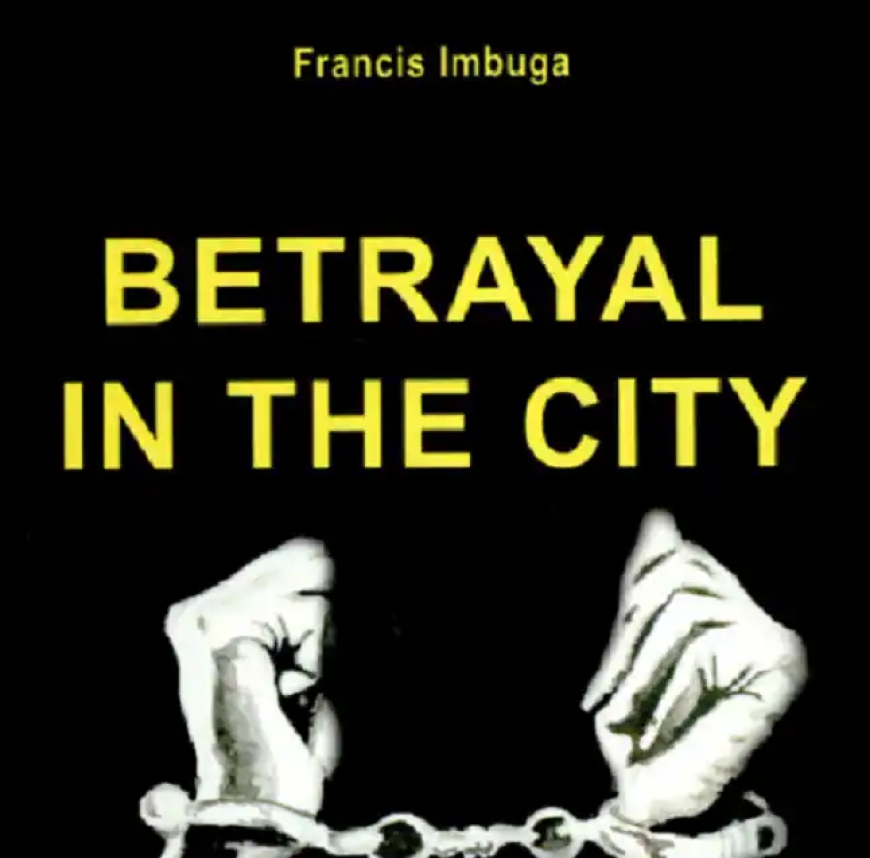Betrayal In The City By Francis Imbuga 2024: Analysis of Examination of Power, Corruption, and Hopelessness
Delve deep into the gripping tale of betrayal, corruption, and struggle in Francis Imbuga's play, Betrayal in the City.

Betrayal in the City is a powerful play by the late Francis Imbuga, first published in 1976. Set in the fictional African nation of Kafira during the post-independence era, the play offers an incisive examination of the challenges faced by Africans after gaining independence. Through a captivating storyline and a cast of diverse characters, Imbuga delves into themes such as Betrayal, corruption, bad governance, hopelessness, and the role of students in society. This comprehensive article will delve deep into the summary, themes, and analysis of Betrayal in the City. Let us journey into the heart of Kafira and unravel the complexities of this gripping literary work.
Summary of Betrayal in the City
The play opens with the grieving parents, Nina and Doga, mourning the loss of their son Adika, who was killed during an anti-government protest. This tragedy sets the stage for a series of events that expose the dark underbelly of Kafira's government. The university students, led by Jusper Wendo, cannot tolerate the corruption and oppression prevailing in their country. They take to the streets in protest, and Adika becomes a martyr for their cause.
As Jusper continues the resistance after his brother's death, he finds himself arrested by the government in an attempt to silence him. However, Jusper's determination grows, and he orchestrates a daring coup to overthrow the corrupt regime. In a tale of revenge, illiteracy, hostility, and conspiracy, the characters collide, each seeking justice and change in their way.
Themes Explored in "Betrayal in the City"
1. Betrayal: A Pervasive Force
The central theme of the play, Betrayal, permeates throughout the narrative. Characters experience betrayals on multiple levels, from interpersonal relationships to political dealings. The treachery ranges from individuals betraying their cultural roots to state agents betraying the public's trust. Mulili, a prominent figure in Boss's regime, stands out as a symbol of Betrayal, manipulating his position for personal gain and causing harm to those around him.
2. Corruption: The Cancer of Society
"Betrayal in the City" illustrates the insidious nature of corruption in post-independence African nations. The play reveals a landscape tainted by nepotism, influence peddling, and favoritism. The Boss himself embodies a corrupt ruler who rewards his cronies with bribes and embezzles public funds for personal gain. The pervasive culture of kickbacks further erodes the country's moral fabric, leading to dire consequences for its citizens.
3. Bad Governance: A Defiance of Reason
The play harshly criticizes the prevailing governance style in Kafira. Boss's government operates with a disdain for the rule of law, issuing arbitrary decrees through his cronies. Key decision-makers like Mulili, Tumbo, Kabito, and Nicodemo fail to provide valuable advice, reflecting the rot within the system. The government's failure to defend the rule of law and its oppressive tactics led to a sense of hopelessness among the citizens.
4. Hopelessness and Disillusionment: Shattered Dreams
The citizens of Kafira grapple with overwhelming feelings of disillusionment and hopelessness. The death of Adika leaves Doga, and Nina devastated and robbed of their dreams for the future. Mosese laments the shattered promises of a better life, highlighting the emptiness that follows false hope. The youth, like Jusper, feel trapped in a society that offers them little prospect for progress.
5. Hypocrisy: A Masked Reality
Hypocrisy surfaces as a prevalent trait among various characters in the play. Boss's treatment of his wife, Mercedes, and his feigned understanding of truth and justice underscore his hypocritical nature. Tumbo pretends to benefit Regina while well aware of Boss's tendencies. Hypocrisy masks the true intentions and perpetuates the prevailing corruption and Betrayal in Kafira.
6. Conflict: Clashing Interests
Conflict permeates throughout "Betrayal in the City." The play opens with a clash between soldiers Jere and Mulili and the grieving couple, Doga and Nina, as they attempt to conduct a traditional ceremony. The play also portrays conflicts between individuals like Kabito and Mulili and broader conflicts between the people's culture and the imposed governance.
7. Greed and Materialism: The Insatiable Pursuit
Greed and materialism plague Kafira's society. Characters like Mulili display an unbridled appetite for wealth and power, leading them to exploit their positions at the expense of others. Boss's pursuit of material wealth and property showcases the materialistic mindset prevalent in the country. This insatiable pursuit of riches perpetuates corruption and deepens societal divisions.
8. The Role of Students and Educated Elite: Catalysts for Change
The play emphasizes the significant role of students and educated individuals in societal transformation. The university students, led by Adika and Jusper, become the catalysts for change by protesting against government mismanagement. The intellectual prowess of Mosese contributes to the coup's success, ultimately overthrowing Boss's corrupt regime. The play advocates for the active participation of the educated elite in politics for positive change.
How does the play reflect the sense of hopelessness and disillusionment among the characters?
"Betrayal in the City" masterfully captures the prevailing sense of hopelessness and disillusionment among its characters. The death of Adika during the anti-government protest leaves his family, Doga, and Nina, shattered and robbed of hope for a better future. The loss of their son symbolizes the shattered dreams and promises of post-independence Kafira. Mosese, a former university lecturer, expresses his disillusionment, stating that the kingdom of heaven they had waited for was all an illusion.
The youth, like Jusper, feel trapped in a society where opportunities for progress are scarce. He laments the need for more prospects and a place for the younger generation in nation-building. The play illustrates the eroded faith in humanity, as seen in Jere's loss of faith, carrying a Bible in prison as a last attempt to restore his belief in humanity.
The corrupt and oppressive governance further compounds the characters' disillusionment. Boss's government rules with an iron fist, suppressing dissent, leading to a climate of fear and suspicion. The restrictions on freedom of expression, police brutality, and extrajudicial killings perpetuate the feeling of despair and hopelessness among the citizens.
Throughout the play, the disillusionment weighs heavily on the characters, making them question the promises of independence and the vision of a better future. It showcases the harsh reality of post-independence nations struggling with broken dreams, shattered hopes, and a loss of faith in the institutions meant to serve and protect them.
READ ALSO: Nyati Sacco Loans: Types, Application Requirements, Forms, Paybill Number
Conclusion
"Betrayal in the City" is a profound and evocative play that captures the essence of post-independence African struggles. Through compelling themes and multifaceted characters, Francis Imbuga masterfully portrays the impact of Betrayal, corruption, bad governance, and hopelessness on a society's fabric. The play urges readers to reflect on the pervasive issues many developing nations face and the crucial role that individuals, especially the educated elite, play in shaping their nations' destinies.
FAQs
Q1: When was "Betrayal in the City" written?
"Betrayal in the City" was first published in 1976.
Q2: What is the central theme of the play?
The play's central theme is Betrayal, which is depicted in various forms, from interpersonal relationships to political dealings.
Q3: How does the play explore the theme of corruption?
The play portrays corruption through nepotism, influence peddling, favoritism, and a culture of kickbacks. Characters like Boss and Mulili embody the corrosive effects of corruption on society.
Q4: What role do students and educated individuals play in the play?
The play underscores the significant role of students and educated individuals as catalysts for societal change. They lead protests and actively participate in the struggle against oppressive regimes.
Q5: What message does the play convey about governance?
"Betrayal in the City" presents a scathing critique of bad governance that disregards the rule of law and perpetuates corruption. The play urges accountable and just governance to address the citizens' challenges.
In essence, "Betrayal in the City" serves as a poignant depiction of the disillusionment and hopelessness experienced by many in post-colonial Africa. The play powerfully portrays the emotional toll of Betrayal, corruption, and bad governance, offering a stark reflection on the challenges faced by the citizens of developing nations.




































































![All 47 Counties in Kenya Ranked by Size and Population from Largest to Smallest[2024]](https://sledge.co.ke/uploads/images/202309/image_430x256_64f970e39a11a.jpg)
![How to buy faiba data bundles with Mpesa, Pesa Link, and Equitel [ 2024 Guide ]](https://sledge.co.ke/uploads/images/202301/image_380x226_63c691f943203.jpg)






